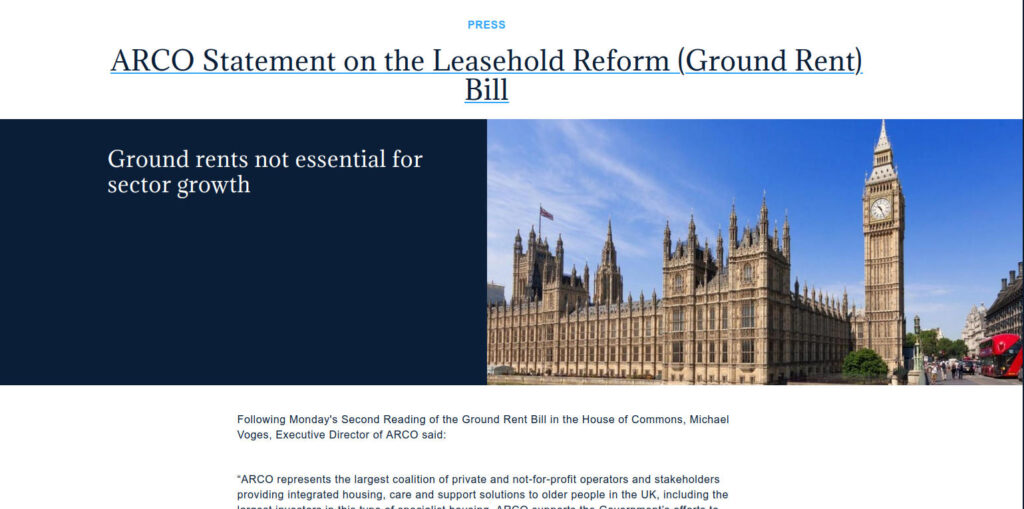
The government’s Leasehold Reform (Ground Rents) Bill to ban future ground rents – and the admin charges to obtain them – at last appeared in the Commons on Monday and largely debated with cross-party consensus.
Disagreements surfaced over retirement housebuilders, who initially won an exemption from the ground rent ban, which was then changed to a two-year delay only.
All of this grumbling came from Conservative backbenchers who have already defended the ground rent speculation business in parliamentary questions and elsewhere.
Much of it – from Sir Desmond Swayne and Theresa Villiers – was straight out of the lobbying briefings of the freehold owning sector, with rather more informed dissent from Kevin Hollinrake, who was concerned about the absence of ground rents and therefore commercial freeholders from large mixed-use sites.
One line very familiar to LKP was the argument that blocks of flats in Scotland are seriously neglected and in need of repair because the professional freehold owner, albeit one based in the British Virgin Islands, was removed in 2012.
This comes from a report in August from marketing firm Savanta on behalf of freehold owning interests the Tchenguiz Family Trust (Consensus; Prop: Vincent Tchenguiz), Long Harbour (Prop: William Waldorf Astor; and Wallace Estates (Prop: Norfolk-based Count Luca Rinaldo Contardo Padulli).
In fact, the ground rent owning investor – with no other interest in the building, such as a flat – has never been a feature of Scottish law and and the English equivalent of the freehold investor was absent. The Savanta report is debunked here:
Labour, of course, welcome the Leasehold Reform (Ground Rent) Bill and largely praised its measures, reserving criticism for the amount of time it has taken to be presented.Lucy Powell (Labour, Manchester Central) and shadow housing secretary also regretted that the bill only dealt with ground rents rather than other leasehold injustices.
LKP strongly disagrees here. We argued long and hard that the government needed to ban future ground rents first in a simple, clear measure – depriving this exploitative sector of a future – and then carry out the other reforms.
There is nothing that the Swaynes and Villiers would like more than a complex, all-embracing leasehold reform bill, allowing scope for years of argument about reversionery vales and obscure details of land tenure.
The result would have risked yet another leasehold reform failure, such as the 2002 Leasehold and Commonhold Reform Act, which failed to bring in commonhold.

The debate was also noteworthy for the warm backing of Robert Jenrick , the former communities secretary, who never seemed that bothered by the issue when in office.
He said of leasehold that it is:
“ … essentially a feudal form of tenure: a product of our rich and ancient history as a country, but one that is no longer fit for purpose. It does not exist in any other developed country and it does not, in essence, have a place in a modern society.”
He graciously praised the “very strong, albeit very small, team of civil servants who have been beavering away on this issue for many months and will have a lot of work to do ahead of them not just in taking the Bill forward but, perhaps more importantly, in preparing the next [leasehold reform] Bill …”
He was strongly opposed to leasehold “used for properties for no good reason”, such as leasehold houses, and he then revealed the degree of opposition he had received from retirement housebuilders – one assumes Churchill Retirement and McCarthy and Stone – to a ban on ground rents.
“As Secretary of State, I came under fierce resistance and lobbying from the retirement property sector. Its lobbyists approached Members of Parliament and my Department and threatened judicial review of our proceedings.
“I considered it to be an unfair practice, targeted at the most elderly and vulnerable in our society, that in addition to paying their service charge they should pay a ground rent that might escalate at a significant pace. Why not have a fairer and more transparent system where an elderly person knows exactly what they are getting when they pay the purchase price on their property and then when they pay the service charge on an annual basis, instead of receiving two bills every year? I think that is a simple matter of fairness and transparency, and it was the right decision to bring that to an end.”
Yesterday the Association of Retirement Community Operators, which represents retirement housebuilders who manage their assets and facilities long-term, put out a statement deprecating both ground rents and that “the decision to ban ground rents should not be subject to judicial review”.
While Mr Jenrick cast himself in the most favourable light for leaseholders during the debate, it was a bit of a shame that Dr Julian Lewis (Conservative, New Forest East) raised the issue of “one rather backward step” in the giveaway to freeholders of allowing two additional storeys on blocks of flats via permitted development.
The bill was rather quietly and charmingly introduced by housing minister Eddie Hughes, who had a private members bill to cap ground rents at £250pa in 2019:
Mr Hughes said:
“the Government’s vision for a reformed and improved leasehold system is one anchored in fairness and transparency. For too long, too many leaseholders have been let down by institutional inertia and a ground rent system that has not worked in their interests. The system has been dogged by opaque rules and left many people in the dark.
Lucy Powell agreed that “serious leasehold reform is long overdue”.
“It stems from arcane feudal laws that date back to an era of landed gentry and aristocracy, and it needs reform urgently.”
Justin Madders (Labour, Ellesmere Port and Neston and a patron of LKP) added further detail and rhetorical flourish to how leasehold had been abused to the detriment of ordinary families.
Additional flourishes came from Chris Bryant (Labour, Rhondda) – “leasehold is preposterous nonsense, is it not?” – and Catherine West (Labour, Hornsey and Wood Green) who named the Berkeley Group – “which should really know better” – and its New River Village:
“[Berkeley Group] has done very well, including throughout coronavirus, given all the leg-ups that it has had from the Government through various coronavirus packages, and it really should not be demanding multiples every year from my poor old leaseholders.”
Mark Tami (Labour, Alyn and Deeside) was among many MPs showing zero trust in our hugely subsidised plc housebuilders in dreaming up further rip-offs through “fleecehold” charges, now that ground rents and leasehold houses were played out.
Andy Carter (Conservative, Warrington South) pleaded for leaseholders at Steinbeck Grange in Warrington South, where they “have been calling for changes for almost 10 years”.
Christian Matheson (Labour, City of Chester) referenced “what we are seeing is nothing more than a financial scam from a bunch of greedy speculators”.
All this made the lobbying for (some) retirement housing providers by Villiers and Swayne more discordant.

I don’t believe in markets, but delighted LKP / NLC have trashed the market in leasehold houses, says Justin Madders
It was not quite a Peter Mandelson conversion to the market economy, but Justin Madders (Labour, Ellesmere Port and Neston) acknowledged that the market in leasehold houses in his patch of the North West was broken.
“I am not generally a fan of market-based solutions—the market is responsible for most of the egregious injustices that we have seen in leasehold—but, to a significant extent, the market has already moved away from imposing ground rents for most houses, not because those who concocted the leasehold scandal have had a prick of conscience but because a spotlight has been shone on the devastating consequences of their sharp practice…”
“A new Redrow estate not far from where I live originally had properties being sold on a leasehold basis. After some pretty determined campaigning from the National Leasehold Campaign, Redrow decided to stop the sale of homes in the second phase as leasehold, but unfortunately not before several hundred people had already bought their homes as leasehold.
“To be fair to Redrow, I should add that it did then offer them the opportunity to purchase the freehold after two years, although it was a little unfortunate, to say the least, when it subsequently lowered the purchase price for the freehold again, creating another unfairness. While I give Redrow credit for stepping back and weaning itself off the leasehold drug, that should not obscure the fact that all this could have been avoided had it not sold the properties as leasehold in the first place.”
When Sir Desmond Swayne – again! – began along the familiar argument that conveyancing solicitors were to blame for buying dodgy products, it was left to Mr Madders to point out that almost all solicitors in the ground rent scandal were recommended by developers, the buyers were first-timers, the marketing included supposed discounts – if you used “their” solicitors and completed by a certain time.
Although Theresa Villiers (Conservative, Chipping Barnet) deprecated “the abusive practices that have prompted this legislation”, she repeated the very familiar argument that “in relation to retirement housing, where the practice has been for ground rents to more or less fund the shared spaces, and ground rents have been part of making retirement housing viable?”
Actually, new retirement flats sell at a premium in relation to the general housing market, although resale prices can be abysmal with price falls from new of 30%, 40%, 50% far from unusual on the Land Registry.
The idea that ground rents are compo for the communal lounge a developer builds is a bit fanciful. Ms Villiers might want to ask what happened to hundreds of retirement house managers’ flats in old McCarthy and Stone developments and others that were part of the communal areas, but unaccountably had leases created for them in 2009 and now belong to the property manager FirstPort?
In a prime London site this would have led to litigation, but it seems that with retirement management you can more or less behave as you like.
https://www.betterretirementhousing.com/tag/house-manager-flat/
Later in the debate, Jane Hunt, the Conservative MP for Loughborough gave the game away about McCarthy and Stone’s lobbying efforts over the bill, beginning her speech:
“I think I got the same memo as my right hon. Friends the Members for Chipping Barnet (Theresa Villiers), and for New Forest East (Dr Lewis) [this is almost certainly an error: she means Sir Desmond Swayne, for New Forest West], as I am going to talk about retirement homes for a moment …
“I have been contacted by a leading developer and manager of retirement communities, which has recently completed Mill Gardens and Farnham House retirement living in my constituency. McCarthy and Stone is concerned about the impact the Bill could have on the retirement sector, following the decision not to provide it with a concession from the ban on ground rents.”
After raising the possibility of a longer transition period, Ms Hunt ask whether “The proposals are likely to mean that retirement developments on which building started when ground rents were expressly permitted will find themselves split, with two lease structures operating in the same building.”
Of course, a block of 100 flats can have – some do – 100 different leases.
But the prime message of Better Retirement Housing is: once the bill is passed no one should buy a retirement flat with ground rent – simply tell the developer to remove it, or walk away.
Kevin Hollinrake (Conservative, Thirsk and Malton), one of the 13 Tory MPs to defy the government over the Owen Paterson fiasco, made more detailed arguments than his other pro-ground rent colleagues.
He questioned commonhold as a “panacea” – LKP has always said it wouldn’t be – and repeated the freeholder lobby’s Savanta report (above).
He questioned the management of complicated mixed use sites, presumably if no ground rents and therefore no supposedly professional freeholders. In 2019 when he sat on the Select Committee for Housing, Communities and Local Government Committee he had argued that complex developments be exempted from leasehold reforms.
Theresa Villiers argued for a similar exemption, adding “if this carve-out were made, there would need to be a robust code of conduct to ensure that the remaining freeholders acted fairly.
Good God! Another code of practice, this time involving freeholders who routinely hide their beneficial interest behind nominee directors and are frequently offshore.
Mr Hollinrake proposed a cap on ground rents at complex developments of “say £100 or 0.1% of the value, whichever was lower, to ensure that the ground rent was always affordable”
Ms Villiers responded: “We would certainly need a cap, and the sort of levels that my hon. Friend mentions sound reasonable to me.”
For Mr Hollinrake, who worked in residential property, “the leasehold system, for most of my life, when it comes to selling and renting property, leasehold has been a perfectly workable form of tenure for most people—for most leaseholders and indeed freeholders. In recent years, there is no doubt that the system has been tremendously badly abused.”
“… commonhold is far and away not, in any shape or form, a panacea. We can see that from the current experience. There are some effective leasehold or commonhold ways of managing blocks, with residential management companies or right to manage agreements, where in effect the leaseholders manage the block and take on the responsibility of a freeholder. However, there are disputes within such blocks or organisations …”
His concerns were strongest at complex mixed use sites. Curiously, it was Robert Jenrick who informed him that the rest of the world seems to cope with versions of commonhold.
Mike Amesbury (Labour, Weaver Vale) wound up the debate for the Opposition, kindly recognising the efforts of the Leasehold Knowledge Partnership and the National Leasehold Campaign.
We agree that abolishing ground rents via peppercorn, and beginning to rebalance the system so that it works for those who live in homes rather than for investors who use them as income streams, looking only for returns, is a good thing. However, as Members have stated—I think we heard from around 11 speakers, including interventions—the Bill deals only with ground rents, and only with the future. The feudal system now unique to England and Wales is still alive and kicking; that is something that I and the former Secretary of State, the right hon. Member for Newark (Robert Jenrick), agree on.

The retirement community operators – housebuilders who manage for the long term – don’t want ground rents, don’t support judicial reviews in the ground rent ban and don’t want association with the retirement housebuilders who are responsible for the sectors many failings: so many that only 2% of over-65s live in designated retirement housing as against 16% in north America and Australia.
ARCO represents commercial operators and charities such as the Extra Care Charitable Trust.
Recent investors in this sector are Goldman Sachs, BlackRock private equity, Legal and General. Why are they investing in this part of the retirement sector and not in the volume housebuilder model, which wants to keep ground rents?





 Lobbying alert: Theresa Villiers MP speaks up for ground rents, freehold owners and making sure marriage value still pays off for freehold investors
Lobbying alert: Theresa Villiers MP speaks up for ground rents, freehold owners and making sure marriage value still pays off for freehold investors






















Watching the debate, I was concerned to hear that regulation will be entrusted to Trading Standards. A proposed incentive is to allow the local authority to keep fines of up to £30,000.
In my experience, Trading Standards (and HM Registrars) make every excuse they can, to ignore property frauds. I feel that the loyalties are too strong, between lawyers in the public and private sectors.
Eddie Hughes said:
This was the bit that I find hard to believe:
“Enforcement will be the responsibility of local trading standards authorities, which already do an excellent job of enforcing similar housing regulations”.
Do we know that trading standards do ANY significant work in the residential property sector, let alone do ‘an excellent job’? Not in my experience.
Obstacles exist for consumers because on the one hand certain practices are prohibited and are strict-liability offences, while on the other hand consumers have no power to make use of the prohibitions for themselves.
That situation become doubly frustrating for those leaseholders who find themselves abused by local authorities.
Agreed. All the government bodies associated with property enforcement need overhauling. Equivocation and obfuscation seem to be part of training for public sector employees in these areas. Can attest to an experience with S106 agreement which local council did not enforce breach of covenants and then claimed covenants would still be enforceable in future. Solution here is to simplify everything and remove over complex arrangements that favour third parties and not the freeholders/residents. Control of everything should rest with the property owner/freeholder as they have a vested interest in their investment.
interesting, Andrew. Each of us could write a book by now, no doubt.
In our town there are 999-year leasehold covenants whereby the district council is obliged to maintain shared areas and parts at its own expense. The complex machinations they indulged in, to try to escape the covenant, are unbelievable. I would say they amount to an aggravated fraud that is still ongoing, and multiple breaches of consumer regs that no-one will enforce.
My own conclusion is that ‘Whitehall’ was behind the deceit and laissez-faire. It remains to be seen whether their power will prevail if further reforms come before parliament. History (surrounding the 1922-26 legislation) teaches us that the professions fight all the way, and then carry on, afterwards, much as before – because they can.
Seb
Retirement Flats from my experience were sold at a premium, were those built by McCarthy & Stone now McCarthy Stone. An elderly relative has just sold a M&S 1 bed flat, the lease purchased in 2004 for £135,000, sold STC for £85,000 after being empty for over 2 years, the loss will be 37% of the purchase price?
Other flats in the vicinity have increased by 60% such as the flats in Ashbrook Court, built in 1986, (not by M&S ) have increased from £38,000 and recently sold c.£112,000 and they are 300 meters apart.
The premium charged pays for the:
* Residential Managers Flat
* Lounge
* Lift
* Laundry
* Kitchen
The Residential Managers Flat Rent is included in the Service Charge and it is no surprise the rent can be up to c.50% above the local rents for a similar flat.
Not all M&S flats lose money, those on the coast have been the exception.
Ground Rent was originally part of the contract between a landlord and their tenant, where the Landlord would annually visit the property to receive a peppercorn rent which was designed not to be a monetary consideration, more of a gesture.
The idea that ground rents are compensation for the communal lounge a developer builds is more than fanciful for Ms. Villiers.
The House Managers Flat (house) 19 Ashbrook Court was sold in 2017 to Flatlaunch Ltd our Landlord for £50,377. includes VAT, Flatlaunch Ltd, and Firstport Ltd (Managing Agent) are connected companies as was the previous Landlord.
The RDMF (house) has been empty for c.10 years, only used as an office since we challenged the sale, where we were to receive £10,000 into the Contingency Fund.
We have tried to find who created the leases for the c.257 Retirement Managers Flats, we have been informed of one, in particular, who had the names Nigel Howell CEO of Firstport Ltd and Ouda Salah CFO as Freeholders, we are checking this information.
That’s not the only thing I have to 2%of my sale price to land lord and first point for selling my lease
Melvin,
A recently sold flat at Ashbrook Court where Firstport Property Services Ltd trading as Firstport Retirement is the Managing Agents, and to sell the flat, payments were required for:-
* £324.00 Firstports Sellar Pack, also known as Welcome Pack?
* £150.00 Estates & Management (E&M) Sellers Ground Rent Pack?
* £150 Retention on Future Service Charge
The Exit Fee of 0.25% of the sale price was not pursued as the solicitor queried the fact the Firstports Sellers Pack did not reflect this item also known as REGISTRATION OF ASSIGNMENT.
It is claimed this Exit Fee is to cover the cost of vetting suitable successors making inquiries approval or rejecting the applicants.
The sale along with Estate Agent and Solicitors fees was a total of £624-00
to Firstport and Flatlaunch Ltd the Landlords whose Agent is E&M Agent.
These payments are considered another of the Revenue Streams introduced by Firstport Ltd for what?
Churchill Retirement, McCarthy Stone and their maintenance companies such as Millstream Management Services who make a mockery of codes of practice such as the ARHM Code of Practice are prime examples of the urgent need for reforms and proper regulation in the retirement sector.